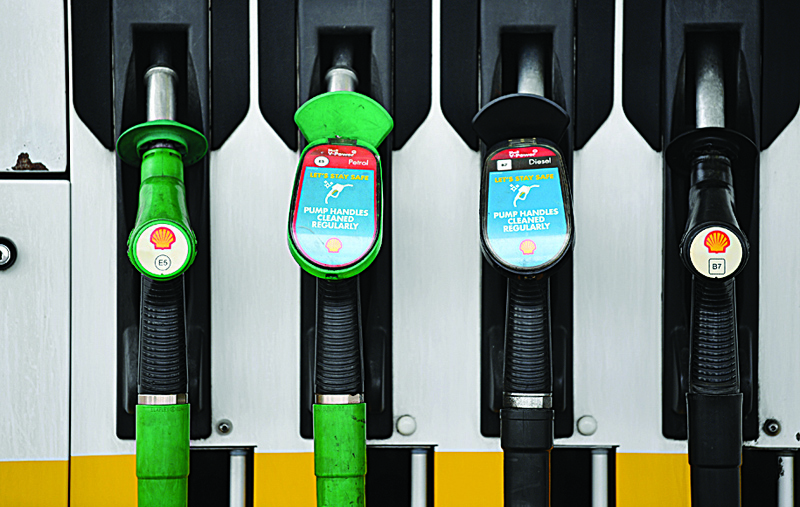 LONDON: Logos are pictured on unleaded and diesel fuel pumps at a Shell petrol station in Etlham, southeast London. Royal Dutch Shell dived into a net loss of $21.7 billion in 2020, the oil giant announced yesterday as the coronavirus pandemic slashed global energy demand. - AFP
LONDON: Logos are pictured on unleaded and diesel fuel pumps at a Shell petrol station in Etlham, southeast London. Royal Dutch Shell dived into a net loss of $21.7 billion in 2020, the oil giant announced yesterday as the coronavirus pandemic slashed global energy demand. - AFP
LONDON: Royal Dutch Shell yesterday became the latest oil major to reveal huge annual losses as the coronavirus pandemic slashed energy demand and prices in 2020. Shell dived into a net loss of $21.7 billion (18.1 billion euros) last year as factories shut and planes were grounded.
The Anglo-Dutch group's loss compared with a net profit of $15.8 billion in 2019, the company said in a statement. "2020 was an extraordinary year," said chief executive Ben van Beurden. "We have taken tough but decisive actions," he said, with Shell having already announced plans to axe up to 9,000 jobs, or more than 10 percent of its global workforce.
'Ugly numbers'
Shell's results and large job cuts mirrors the situation elsewhere in the energy sector. British rival BP, which is cutting around 10,000 roles, reported Tuesday a 2020 net loss of $20.3 billion. US giant Exxon Mobil suffered a 2020 loss of $22.4 billion, while for Chevron it was $5.5 billion. "Recent results from other oil majors paved the way for an uncomfortable read and Shell's results indeed contain some ugly numbers," noted Richard Hunter, head of markets at Interactive Investor.
"The pandemic has clearly had a severe impact on performance and the oil price in particular. "The dual effect of over-supply and crippled demand as aircraft stood idle, travel reduced to a trickle and manufacturing all but ceased during lockdown, has shown itself in these numbers," Hunter added.
After lockdowns began to spread towards the end of last year's first quarter, oil prices dropped off a cliff, even briefly turning negative. Prices then rebounded sharply however-and by yesterday the benchmark Brent North Sea oil contract was closing in on $60 per barrel. Despite economic recovery hopes being boosted by the start of vaccine rollouts, Shell said "there continues to be significant uncertainty in the macroeconomic conditions, with an expected negative impact on demand for oil, gas and related products".
Nevertheless, Shell said it expects to increase its first-quarter dividend by four percent. Last year, it cut its dividend for the first time since 1945. The massive losses for energy companies meanwhile come as they accelerate plans to transition into greener energy, which demands big investments at a time when the oil majors are looking to make sizeable savings.
"The ability of these huge companies to adapt to the prospect of having to restructure their business to a lower demand world as well as adapt to an accelerated green agenda would pose challenges for an ordinary business, let alone one that relies on fossil fuels to power its business model," noted Michael Hewson, chief market analyst at CMC Markets UK. - AFP

